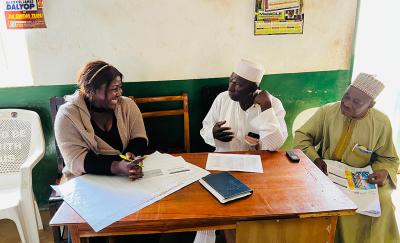Digital Tools, Data Visualization, and Storytelling Bring the Impacts of Climate Change Home


For data to be actionable, it has to be understood. As we continue to feel the effects of climate change, it’s more important than ever that the data illustrating those effects are clear. That’s why the U.S. Environmental Protection Agency (EPA) enlisted Abt’s data scientists and climate researchers to help relaunch EPA’s Climate Change Indicators website with new digital tools that make climate data interactive, relatable, and personal.
Bringing the Data to Life
Since 2010, the EPA Climate Change Indicators report has captured select indicators to help us better understand the causes and effects of climate change, from sea-level rise to the increasing frequency of wildfires to changes in human health. The goal is to help EPA, stakeholders, and the public better understand these effects. Historically, Abt has contributed to identifying and analyzing these indicators—most recently, we’ve helped develop indicators related to Lyme disease and West Nile Virus as additional examples of the far-reaching impacts of climate change.


But the report itself was originally designed as a static printed document, which has limitations on how engaging it can be for readers, even when available in a web format. An Abt team, led by T.J. Pepping, had helped EPA convert static content in the Greenhouse Gas Reporting Program (GHGRP) annual Data Highlights webpages to more interactive versions of the same charts and maps, which resulted in a 50 percent increase in user engagement. EPA knew that the climate indicators report could benefit from a fresh, user-centered digital approach, and asked us to provide a similar upgrade for aspects of the Climate Change Indicators website.
In addition, the digital approach benefits data managers who maintain the large climate indicators databases. “As with the GHGRP Data Highlights report, we’re using Qlik Sense, Highcharts, and ArcGIS to generate embedded and interactive content,” says Pepping. “That not only enables us to provide functionality that can really improve user experience, but it also streamlines the workflow on EPA’s side by making it much easier to update and manage all the content in one system.”
These features are readily available in the Climate Indicators Explorer, which provides a single webpage for users to explore the data across multiple indicators through interactive charts. This tool supplements the report with a new dynamic and web-optimized presentation. By allowing users to search across multiple indicators and zoom in to particular data points or datasets, this tool enables users to more fully see the changes observed in the world around us.
Telling the Story
Additionally, the Abt team created a Community Connections StoryMap, which highlights how different indicators affect specific communities around the country. These stories range from the shifting Cherry Blossom season in Washington, D.C. to temperature-driven impacts on the salmon that play a huge role in the Nez Perce tribe’s way of life.
“If you’re looking at any kind of website and you can interact with it, the information is likelier to stick,” explains Pepping. “There’s a big academic and policymaker focus on this information, but we and EPA also want people to see and understand what climate change means. We hope that the interactive content presented in a more narrative-driven approach helps leave a greater impact on the viewer, enabling them to better understand and relate to the effects of climate change.”
Read more about our Climate Change work.
Read More

Pathways to UHC: Nigeria’s State and Local Approaches to Financing Integrated HIV Services and Primary Health Care
Nigeria’s state and local government-driven approaches to integrated primary health care are transforming financial protection and access for vulnerable populations, setting a replicable model for sustainable universal health coverage.

Engaging Men in Gender-Based Violence Prevention
To observe the 16 Days of Activism Against GBV, Abt is convening a webinar on engaging men in GBV prevention.

The Next Phase of Financing for Resilience
In our webinar, explore innovative financial strategies to enhance climate resilience and scale finance for sustainable development in emerging markets.

Global Digital Health Forum (GDHF) 2024
Abt Global is sponsoring and presenting at the Global Digital Health Forum (GDHF) 2024.